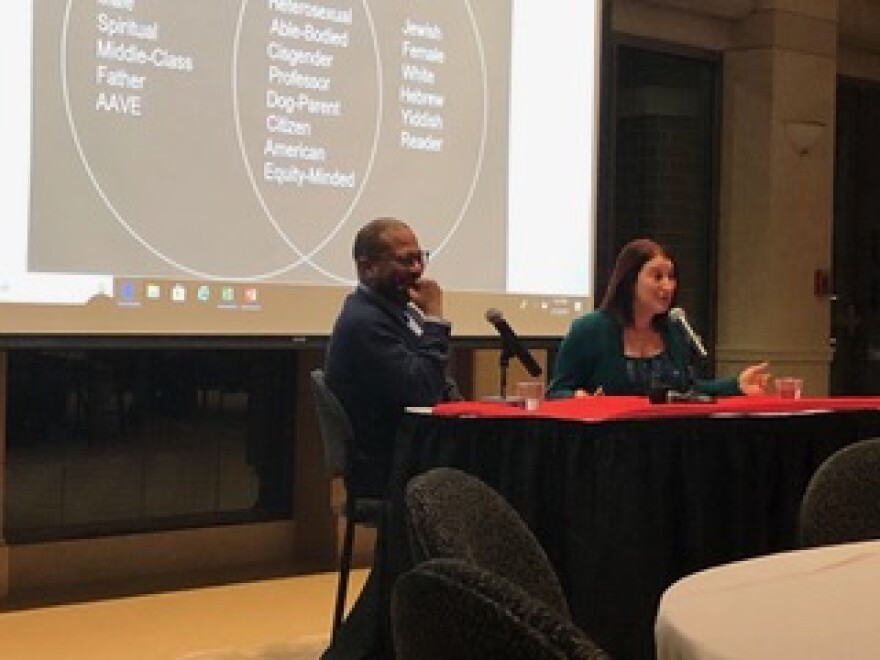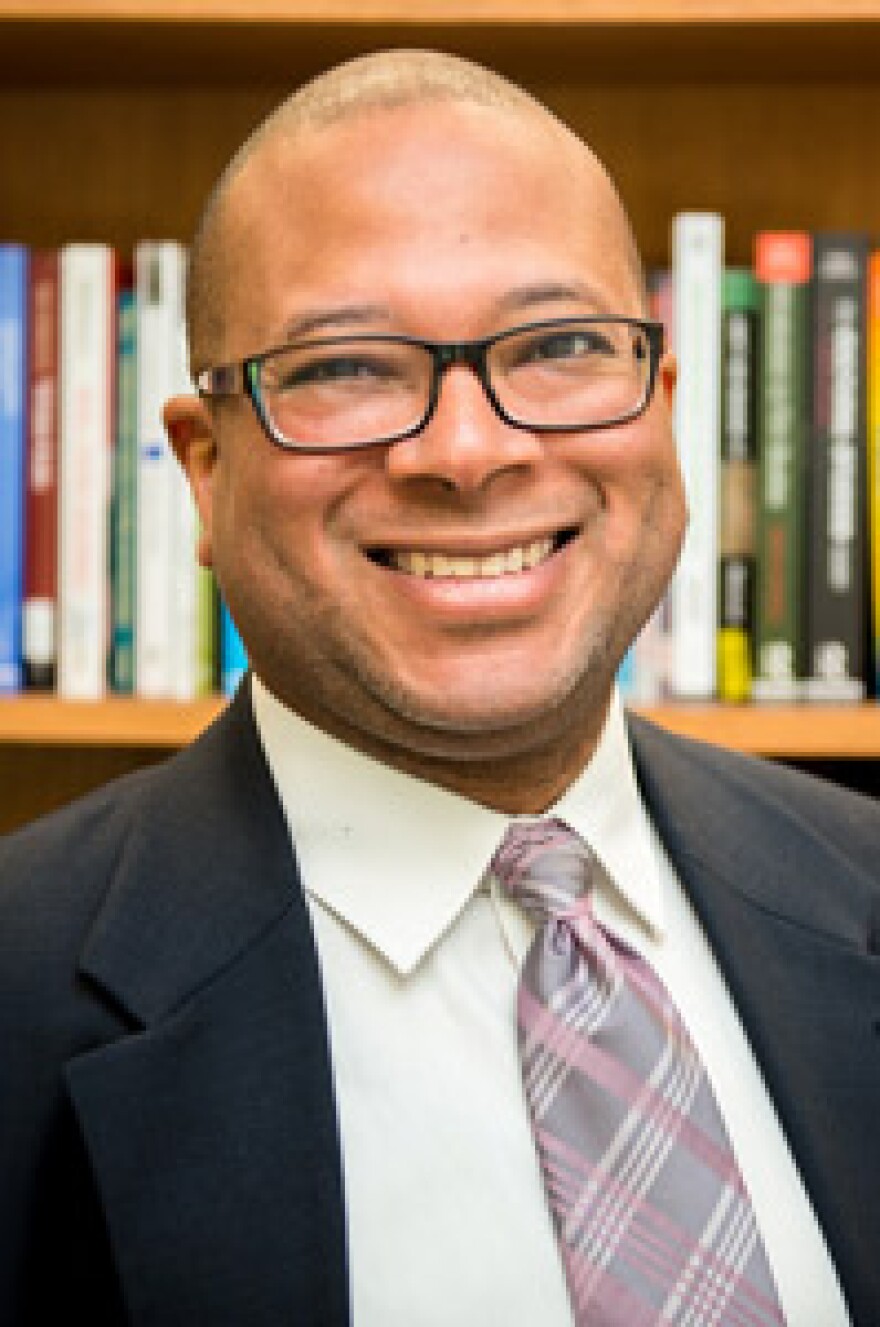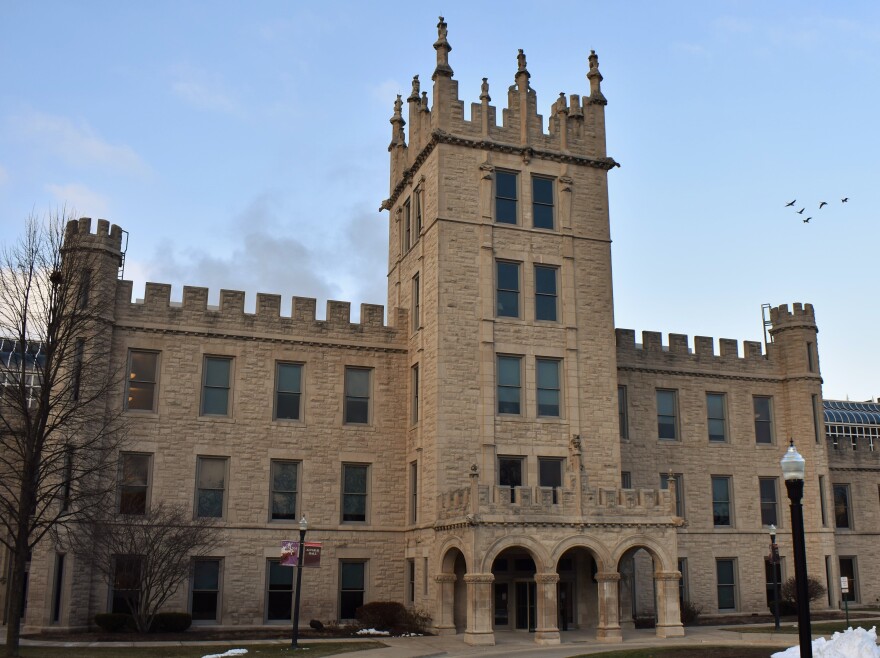How do you talk with people about race? What is white privilege? How can people have a productive conversation about difficult topics? These are some of the questions posed at a recent dialogue at Northern Illinois University. NIU professors Joseph Flynn and Melanie Koss sat down at a panel moderated by WNIJ.
Joseph Flynn is an African-American man. Melanie Koss is a Jewish white woman. They focused on how to have constructive conversations about difficult topics as part of marginalized communities. Koss teaches courses on children's and young adult literature, highlighting issues of diversity.
"I do what I do because it took me a really long time, and I'm still learning about the realities of our world and systemic racism and hate and prejudice. And it's really important to me to be able to talk about it with others, to bring things to the forefront," said Koss.
Koss said she wasn't always conscious of social issues.

"I was ignorant. I wasn't stupid but I was ignorant because I didn't know," said Koss.
"I've really spent -- and I'm still learning, I'm still challenging myself -- to learn what is social justice? What is systemic racism? Why is our world not a meritocracy?" she said.
Flynn teaches education and curriculum. He said there's a lack of empathy in American society.
"I feel like when it comes to sensitivity, Americans have a tendency to just turn a blind eye. I think we give a lot of lip service," said Flynn.
Many people like to think they'll speak up when they see or hear something offensive, but Koss said that's not always the case. She said constructive dialogue happens best in a welcoming environment.
"But you also need to be in a space that the conversation is going to be receptive. I would like to say that when confronted in a situation, I would speak up. But it doesn't always happen. It happens when I feel that it will be received in a way that won't be too confrontational or negative. And I think, unfortunately, a lot of the time we have the conversations with the people that we already can have those conversations with," she said.

Flynn says most conversation around race is sparked by negative stories.
"I've been thinking lately about the idea that when we talk about racism, when we talk about race and and all these identities, we tend to always start the conversation in a drastically negative place," he said. "You know, 'Oh, another unarmed black kid got shot by a cop, let's talk about race now. Oh, somebody dressed up in blackface so let's talk about race now.'"
Flynn says productive learning can't happen when discussions look more like debates.
"I've been studying this systematically for 25-30 years now. I've read a lot, I've seen a lot, I've written a lot, I’ve taught a lot. And people will still look at me to this day and say, 'Oh well that's just your opinion.' As though it means nothing. And that really pisses me off," said Flynn.
Koss spoke of her experiences with white privilege.
"I think a really important idea is when Joe walks out of the house and people see him, he's a black male -- that's who he is and that's how people see him," Koss said. "If I walk out of the house, people first see me as a white female. They don't necessarily know I'm a hidden minority being Jewish."
Koss drilled down further:
"So aside from the fact that I'm wearing a Jewish star around my neck, and I'm very open talking about it, I can hide if I want. So I do a lot of social justice work, and it's really important to me and to who I am. But I -- if I just am tired of engaging -- I can just close the door, so to speak. I don't have to fight the fight all of the time, whereas Joe does. And so I think that that's something for us to be aware of too, that if you're a black woman, that is how you're seen and perceived with all the baggage and all the great stuff that comes with it. And you can't get away from that. Whereas if I want to, I have white privilege, I can. So I think also being aware of who the people around you are, and the way that they have to walk and engage in the world, even just that awareness and reflection in and of yourself -- you're actually starting to do those conversations," she said.

Flynn says self-reflection can be a challenge.
"I've seen interviews on TV with self-avowed white supremacists and Klansmen where they say, 'I'm not racist, I just don't want to live around them,' you know?" Flynn recounted. "And I think to go that much deeper, especially when it comes to racism, that's a part of the reason why it's really difficult to have conversations with white folks about race -- because no, I don't know a white person who wants to be labeled racist. And so when you say something that they may have done was racist, it immediately throws up blinders: 'But I'm not racist!' And I was like, 'Yeah, you might not be but you did something that is!' So let's just deal with that, you know? And so racism for white folks becomes that Achilles heel that is constantly being guarded. And there's a lot of vulnerability in exploring one's own identity."
Koss advises people not to get defensive if called out, whether the offense is intended or not. Rather, she said, use it as a learning opportunity. Flynn agreed.
"It's not that you do something or say something that might be ill, it's how you deal with it in the aftermath. If somebody tells you, 'Yeah, what you just said was offensive,' the worst thing you can do is turn around and say, 'Oh!' You know, get all hot up under the collar and act a fool about it. Just apologize. There's a part of me that feels like all of this is not rocket science. It's not just about being a human being and recognizing that other people have different experiences. And they're just as valid and legitimate as yours. And that's across all of these identities," he said.
Flynn suggested using entertainment instead of divisive news stories about race and identity to get a conversation going..
"You want to try to find vehicles that ease you into the conversation rather than just waiting for some kind of event to happen. Because when an event happens, you're just operating off your gut instinct. And it's oftentimes not a critical engagement. But if you watch Black-ish, or BlacKkKlansmen, or if you're really bold, 12 Years A Slave," he laughed. "Sorry. Or, you know, some kind of material that is designed to engage, encourage discussion -- do it. The worst that'll happen is somebody will say no and you still get to watch something good anyway."

Koss said taking small steps into sensitive topics can go a long way.
"The conversation doesn't have to only be around race. There's so many other ways that people are marginalized or othered. So race is an obvious one that we often talk about. But it can be really scary to jump right in and start talking. So baby steps. Maybe go somewhere that is a little bit out of your comfort zone and try to meet new people. Maybe talk to the people around you and try to find ways that you're similar to each other. Or ask questions about things you notice that are different. But I don't think you have to just jump feet first into the most difficult conversation that you can have," said Koss.
The Diversity Dialogue Series is for participants to heighten their awareness, become comfortable in engaging in intersectional dialogue and utilize the understanding obtained to expand beyond cultural competency to the action of social justice. The next one will be held Feb. 26 at NIU.


